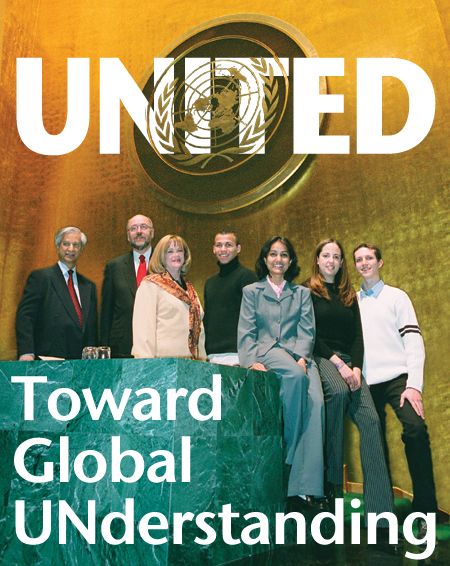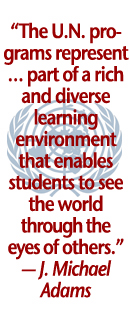
At the General
Assembly of the
United Nations are,
from left, Ahmad
Kamal, former
ambassador from
Pakistan and president
of The Ambassador’s
Club at the United
Nations; FDU President
J. Michael Adams;
his wife, Susan Adams;
and FDU students
Mark Bullock, Payal
Agarwal, Marisa Puga
and Laurent Grandin.

By Angelo Carfagna

“There are few ambassadors at the United Nations who do not know of the concern at our institution for international
well-being and understanding.”— Peter Sammartino
Those words were true when Fairleigh Dickinson’s founder Peter Sammartino wrote them in 1972. And today, more than ever, they ring true, as the University has renewed its long-standing ties to the world body.Ambassadors frequently visit the campus for a special lecture series, students and faculty enjoy privileged access to U.N. briefings and facilities, videoconferences are broadcast from the Manhattan headquarters to the University, students are interning at the United Nations, and a U.N. student club has formed.
President J. Michael Adams and Michael Sperling, associate provost for interdisciplinary, distributed and global learning, along with Ahmad Kamal, senior fellow at UNITAR (U.N. Institute for Training and Research), president of The Ambassador’s Club at the United Nations and former ambassador of Pakistan to the United Nations, have been instrumental in forging close ties.
For the University, the U.N. relationship is an important part of its mission. “It’s a vital resource right at our doorstep and a major part of our efforts to educate global citizens,” says Adams. “Our students gain exposure to important international perspectives, and meet and talk with international leaders.”
Education, says Adams, should help change an individual’s world. And FDU’s U.N. connection does just that. He declares, “The U.N. programs represent a significant piece of a mosaic that we’re trying to put together; part of a rich and diverse learning environment that enables students to see the world through the eyes of others.”
Sperling adds that the U.N. relationship not only plays a part in the transformative process of global learning, but it has helped the University advance its reputation. “As a result of the U.N. programs, more and more people recognize our University as a center of global learning, and that’s very important.”
From the foundation built, Kamal, Sperling and Adams see more connections blossoming. Kamal says, “We have encouraged not just the students but also the faculty to use these opportunities. The more they do so, the greater the relationship will grow between the United Nations and this University dedicated to creating global citizens.”
Renewing Old Bonds | An Illustrious Lineup
Curricular Connections | In the Front Lines
Students Seize the Initiative | A Long Line of Links
FDU Magazine Home | Table of Contents | FDU Home | Alumni Home | Comments
©Copyright 2004 Fairleigh Dickinson University. All rights reserved.
For a print copy of FDU Magazine, featuring this and other stories, contact Rebecca Maxon, editor,
at 201-692-7024 or maxon@fdu.edu.